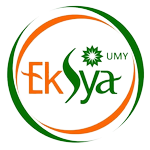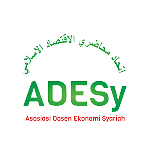Islamic Banking Products and Economic Development in Nigeria: A Co-Integration Approach
DOI:
https://doi.org/10.18196/jiebr.v1i2.30Keywords:
Co-integration; Economic Development; Islamic Banking; Sharia; NigeriaAbstract
The authorization of Taj Bank Limited to operate Islamic banking in Nigeria has reiterated the relevance of Islamic banking products and services in the nation’s economy. However, the rate of patronage has been dampened compared to the conventional banks due to the issues of regulations and taxes, issues revolving around Sharia Scholars, Sharia-compliant products, and lack of awareness, among others. The study, therefore, investigates the nexus between Islamic banking products and economic development in Nigeria between 2013Q1 - 2019Q4. The data such as Human Development Index (HDI) proxy of economic development, and Islamic banking products; Murabahah (MUR), Wadiah (WAD), Istisna (IST), and Ijarah (IJA) were gathered from United Nations Statistics and Prudential and Structural Islamic Financial Indicators (PSIFIs). The data were analyzed using Eviews 9. The techniques adopted include descriptive statistics, correlation matrix, unit root test, co-integration statistics and Error Correction Model (ECM). The unit root test showed that all the data series were stationary at the first difference I(1). The co-integration results revealed the existence of a long-run relationship between Islamic banking products and economic development. However, the error correction model established that the short-run disequilibrium would be corrected and signed in the long run at 33%. It was therefore concluded that there exists a nexus between Islamic banking products and economic development in Nigeria. The study recommends among others, that government should encourage more operations of Islamic banking so that Nigeria can achieve the objectives of financial inclusion, which is an essential ingredient of economic development.
References
Abdu, M., Jibir, A., Abdullahi, S., & Rabiu, A. A. (2018). Can Islamic banking and finance spur financial inclusion? Evidence from sub Sahara Africa. CBN Journal of Applied Statistics, 9(1), 77-104.
Adeel, A., Tariq, A., Ahmad, N., Ahmad, H., & Shafique, M. N. (2015). Does Islamic banking system contributes to economic development?. Arabian Journal of Business and Management Review, 3(8), 1-5.
Benhayoun, N., Chairi, I., El Gonnouni, A. & Lyhyaoui, A. (2014). Islamic banking challenges lie in the growth of Islamic economy despite of the free interest loans policy: Evidences from Support Vector Machine Approach. ACRN Journal of Finance and Risk Perspectives, 3(1), 19 – 31
El-Galfy, A. & Khiyar, K. A. (2012). Islamic banking and economic growth: A review. The Journal of Applied Business Research, 28 (5), 943-955
Furqani, H., & Mulyany, R (2009). Islamic banking and economic growth: Empirical evidence from Malaysia. Journal of Economic Cooperation and Development 30(2), 59 –74.
Hassan, M, & Dridi, J. (2010). Put to the test Islamic banks were more resilient than conventional banks during the global financial crisis. Finance and Development, 46-47.
Imam, J. S. (2010). MicroRNA-185 suppresses tumor growth and progression by targeting the Six1 oncogene in human cancers. Oncogene, 29(35), 49-71
Ismail, A. G. (2010). Islamic banks and wealth creation. ISRA Research Paper No 9/2010. International Shari’ah Research Academy for Islamic Finance
Kahf, M. (2005). Islamic Banking and Development: An Alternative Banking Concept? In Hassan and Lewis Handbook. 1-15
Lawal, I. M., & Imam, U. B. (2016). Islamic finance and economic growth: Empirical evidence from Nigeria. Journal of Economics and Sustainable Development, 7(16), 99-108
Ledhem, M. A., & Mekidiche, M. (2020). Economic growth and financial performance of Islamic banks: A CAMELS approach. Islamic Economic Studies, 28(1), 47-62
Martin, R. L. & Osberg, S. (2013). Social entrepreneurship: The case for definition-based enterprise. Academy of Management Review, 31 (2), 309-328
Muhammad, T. & Dauda, S. (2018). Islamic finance in promoting economic growth in Nigeria. South East Asia Journal of Contemporary Business, Economics and Law, 15(5), 41- 45
Mustapha, D., Baita, A. J., & Usman, A. Y. (2018). Impact analysis of Islamic finance on financial inclusion and economic growth in selected Muslim countries: Lessons for Nigeria. International Journal of Economics, Management and Accounting 26(2), 393- 414
Mustapha, D. A, & Idris, M. (2015). The contributions of Islamic economics and institutions to modern Nigeria. Journal of Islam in Nigeria, 1(1), 36-58.
Nienhaus, V. (1986). Islamic economics, finance and banking, Journal of Economics, Banking and Finance, 3(1), 36-54
Nwaolisa, E. F. & Kasie, E. G. (n.d). Islamic banking in Nigeria: A critical appraisal of its effect on the Nigerian economy, 37 – 48
Olawoyin, O. (2019). What Islamic finance products can do to Nigeria’s capital market, infrastructural growth? Premium Times, August 13, 2019, 1-13.
PricewaterhouseCoopers (2013). Islamic finance: Creating value, 1-36. Available at www.pwc.com
Saleem, S. (2008). Role of Islamic banks in economic development. MPRA Paper No. 6449, 1- 77.
Sen, A (2001). Development as freedom, (2nd edition). New York: Oxford University Press. ISBN 9780192893307
Tawfiqi, D. N., Ahlia, A. H., Masfaka, M. M., & Muwafak, B. M. (2018). The role of Islamic banks in the entrepreneurial success: Evidence from Bahrain. International Journal of Entrepreneurship, 22(2), 1- 22
Usman, A. S., & Tasmin, R. (2016). The role of Islamic microfinance in enhancing human development in Muslim countries. Journal of Islamic Finance, 5(1), 053-062.
Zubair, H. (1995). Economic Development in Islamic Perspective: Concept, Objectives, and Some Issues. Journal of Islamic Economics 1(6), 80-111.
Zulkhibir, M. (2016). Financial inclusion, financial inclusion policy and Islamic finance. Macroeconomics and Finance in Emerging Market Economies, 9(3), 1-18.
Downloads
Published
How to Cite
Issue
Section
License
Copyright (c) 2021 Journal of Islamic Economic and Business Research

This work is licensed under a Creative Commons Attribution-NonCommercial 4.0 International License.
Journal of Islamic Economic and Business Research has CC-BY NC or an equivalent license as the optimal license for the publication, distribution, use, and reuse of scholarly work for non-commercial purpose. The non-commercial use of the article will be governed by the Creative Commons Attribution license as currently displayed on Creative Commons Attribution-NonCommercial 4.0 International License
Creative Commons License




